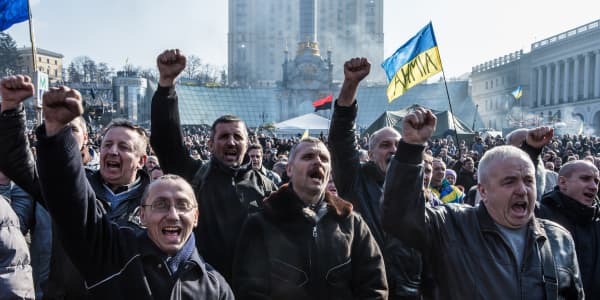Like many of his cohorts attending the annual World Economic Forum in Davos, Switzerland, Oliver Niedermaier is among thousands of political and economic leaders who believe they can change the world. But Niedermaier, CEO of New York-based Tau Investment Management, is one of the few who think they can do it by tackling inefficiencies in the global supply chain.
Niedermaier has teamed up with investor Alexander Soros— the son of billionaire financier George Soros— and the Global Emerging Markets group (GEM) to raise $1 billion in his mission to revamp the vast infrastructure that moves millions of products and materials around the world.
He said industries like electronics and toy manufacturing are full of inefficiencies and outdated equipment that can be upgraded for a nice profit. His Tau Investments has chosen as its first target textile and apparel manufacturing in emerging markets, a $1 trillion industry that has been in the headlines recently for such disasters as the Rana Plaza building collapse in Bangladesh last May that took 1,129 lives.
"Global supply chains are a huge turnaround opportunity," said Niedermaier, describing the garment industry as engaged in a "race to the bottom" as it cuts corners to keep costs down. By tackling a range of problems, from obsolete sewing equipment to inefficient lighting and poorly trained management, he believes he can turn a healthy profit for his investors while improving working conditions, creating a cleaner environment and boosting pay for employees.
Niedermaier described the typical garment factory owner in the developing world as: starved for capital; lacking the experience to scale up operations; thin in middle management to improve productivity; and suffering high staff turnover.
He added: "In addition, they don't have the means to deal with compliance requirements as there is more and more pressure on corporate buyers to clean up their supply chains."
(Read more: Political risk high in 2014: Zurich CEO)
The Value Equation
Chris Brown, founder and director of 20-year-old GEM, noted his firm joined the effort both for the social benefits and profits it can generate. "These failures have a moral color, but their effect is also to sap profits and siphon off value," he said. "Modern production systems are teeming with turnaround opportunities, but to date, investors have not seized upon them."
GEM will act as both a limited partner and general partner in the Tau fund, which is targeting private family funds, sovereign funds, state pension funds and institutional investors. "We expect to make individual investments in specific factories and companies of ranging from $20 million to $50 million each over the lifetime of our transformational investment." Brown expects the fund to make four to six investments in the next 12 months, targeting Asia and Latin America.
(Read more: Recovery talk ignores jobs crisis)
The End of Sweatshops
Global supply chains are a huge turnaround opportunity.Oliver NeidermaierCEO, Tau Investment Management
One organization that has worked to improve working conditions for garment workers is the independent Workers Rights Consortium. Scott Nova, the executive director, is skeptical of Niedermaier's efforts. He said retailers are already intensely focused on improving supplier efficiency. "What we haven't seen is the efficiency gains translating into higher wages or better conditions for workers."
Nova believes that working conditions have deteriorated because of the pressure from global corporations on factories to lower costs. "The interests of apparel workers and global corporations are not going to come magically into alignment, "he said. But he would welcome Niedermaier's initiative "if they are willing to invest in factories that will pursue a different business model."
Haiti's fledgling garment industry, with some 31,000 workers, has been the subject of criticism by Nova's group—unfairly, its representatives contend.
Unique trade preferences granted by the U.S. under the HOPE Act has Haitian entrepreneurs dreaming of growing a garment industry with 1 million workers in a country with a population of 10 million.
Yves Savain, executive director of a Haitian garment industry group, estimates the small Caribbean nation needs $100 million to upgrade its existing clothing factories and build new ones. "If Tau has capital at reasonable rates, targeted at factories assembling garments, it will find qualified customers here."
With that kind of demand, Tau's $1 billion fund may be just a beginning. Tau understands it has to first prove its concept will turn a profit. "If we show we can make money, more money will come," says Niedermaier.
—By Joel Dreyfuss, Special to CNBC.com.




